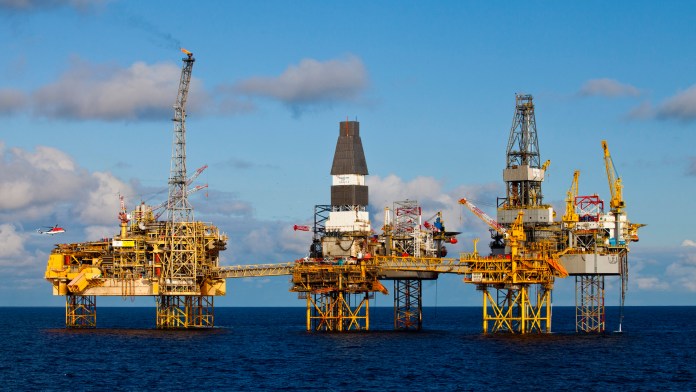
Accra, Ghana//-Ghana’s upstream petroleum sector is fraught with challenges as the country celebrates 10 years of oil production.
These challenges according to industry experts could spell doom for the sector as well as the country, if they are not addressed swiftly.
CHALLENGES
Exxon Mobil Corporation, an American multinational oil and gas corporation unceremoniously exited Ghana’s oil fields and subsequently relinquished 100% percent of its oil exploration rights.
The oil company used to control 80% of the Deepwater Cape Three Point block (DWCTP block), with the Ghana National Petroleum Corporation (GNPC) holding 15%, while the remaining 5% is held by Goil Offshore Ghana.
This sad news was broken in a letter addressed to the Minister of Energy and other stakeholders on 18th May 2021 at a time when major oil companies appear to be moving away from oil.
Jeopardy
Commenting on this unhealthy development, Ranking Member on the Energy and Mines Committee, John Abdulai Jinapor worried that ExxonMobil’s departure could jeopardize Ghana’s ambition to produce about 600,000 barrels of oil per day (bpd) by 2024. The country currently produces over 70,000 bpd.
“This is going to be a big hit to the country that didn’t anticipate it. This is where we are, they have decided that they will not continue with that agreement so we are back to square one, we have to start all over again,” he said.
Huge setback
The Minister of Finance [Ken Ofori-Atta, lamented: “Well, this is a huge setback because the country is poised to produce about 600,000 barrels of oil”.
In the 2021 budget, the government had outlined a lot of factors including ExxonMobil oil production. The company was supposed to spend some money to explore and eventually begin production, so its decision to exit certainly sends the wrong signal.
ExxonMobil is one of the biggest oil companies in the world and so if it leaves Ghana it definitely doesn’t send a very good signal, experts added.
It is not surprising
Dr Theo Acheampong, a UK-based petroleum economist and political risk analyst said the decision by ExxonMobil to abandon its exploration exercise in Ghana is not coming as a surprise.
According to him, most of the international oil companies (IOCs) are now prioritizing their portfolios across the board to support energy transition demands.
Confusion rocks Springfield and ENI unitization
Another challenge which the government is dealing with is the Springfield and ENI unitization brawl.
Continued delays in the unitisation of the Sankofa and Afina fields are putting the country’s attempt to rake in $8.4billion revenue in jeopardy at the time when the country needs such revenue badly.
According to Institute for Energy Security (IES), a leading energy think-tank, the amount comprises royalties, bonuses, fees and levies, as well as additional oil entitlement; and income tax.
These delays are due to the inability of Eni Ghana Exploration and Production Limited (ENI) and Springfield E&P (Springfield) to cooperate and unitise the Afina and Sankofa fields over a year.
In April 2020, the Ministry of Energy in a letter signed by former Minister Peter John Amewu directed the two firms to unify their fields.
The decision resulted into a series of engagements and analyses of post-drill data, which showed that the Afina discovery in the West Cape Three Points (WCTP2) belonging to Springfield and Eni’s Sankofa field in the Cape Three Points (OCTP) contract areas were one and the same.
After the unitisation directive, the two companies are yet to sign the Unitization and Unit Operating Agreement (UUOA) to unitize.
Mark Agyemang, Technical Manager of Public Interest and Accountability Committee (PIAC), an independent statutory body mandated to promote transparency and accountability in the management of petroleum revenues in Ghana, noted: “Strong negotiating capacity is key to realising maximum value”.
On the verge of collapse if
Emmanuel Armah Kofi Buah, a former Minister for Energy, lamented that Ghana’s petroleum upstream sector is on the verge of collapse if the government fails to address the current happening in the sector.
He said: “In January 2017 when this government began, Ghana had 16 offshore licences: three were producing fields-Jubilee, Tweneboa, Enyenra, Ntomme (TEN) and Sankofa Gye Nyame; Hess Pecan Field-Deepwater Tano Cape Three Points was appraised and ready for development; Hess left and sold out to Aker and the rest was history. That field is still begging to be developed.”
All 12 blocks in exploration stages had obligations to either acquire some amount of 2D or 3D seismic and or drill an exploration well, he noted.
Mr Kofi Buah who is also the MP for Ellembele Constituency, explained that this obligation was well negotiated for in the various Petroleum Agreements signed by the then government.
“From 2017 to date, only four exploration wells have been drilled by AGM (two wells under amended terms-if you recall these amended terms reduced Ghana’s take from 43 percent to 18 percent. Eni (one well) and Springfield (one well) for which three oil and gas discoveries were made.
“Thanks to the good leadership of the previous administration, the only producing fields in Ghana today are Jubilee, Sankofa and TEN fields, none has been added. Unfortunately, these fields are declining as we continue production each day of the year.
“Jubilee has been producing oil and gas since 2010. We have already produced about 50 percent of the Field Reserves.
“TEN and Sankofa are also going down. If exploration is not prioritised, the industry will die off. If Ghana does not find more hydrocarbon resources and develop these fields, the worst fear is that the service industry, which is already feeling the impact of the lack of activity and is dying slowly, will go into bankruptcy if the trend continues and this must worry well-meaning Ghanaians,” Mr Kofi Buah said.
Bottom line
Ghana’s Blueprint and Roadmap For Accelerated Oil And Gas Exploration And Development (2018) stipulates: “Government’s energy policy goal is to sustainably develop and manage Ghana’s oil and gas resources in a transparent and environmentally responsible manner, to rapidly develop national infrastructure, increase agricultural productivity and industrial value added production for the benefit of every Ghanaian, now and in the future”.
By Masahudu Ankiilu Kunateh, African Eye Report
Email: mk68008@gmail.cm


